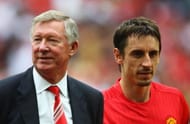Neville learns his lesson, 2007
“If the coach has no control, he will not last.” In 2012, the Harvard Business Review looked for some words of wisdom from Alex Ferguson and found them. ”If the day came that the manager of Manchester United was controlled by the players – if the players decided how the training should be, what days they should have off, what the discipline should be, and what the tactics should be – then Manchester United would not be the Manchester United we know. You have to achieve a position of comprehensive control. Players must recognise that as the manager you have the status to control events. I wasn’t going to allow anyone to be stronger than I was.”
In a Champions League knockout tie at Lille in 2007, Ryan Giggs took a free-kick quickly while the opposition were still trying to assemble a wall and scored. It stood, and Lille walked off in disgust. Multiple narratives were being formed. Gary Neville recounts in Red: “‘Come on, get on with the fucking game,’ I said to their captain, following him towards the side of the pitch. The next thing I knew the manager was charging down the touchline shouting at me. ‘Neville, what are you doing? Get back on!’ He had really snapped. As far as I was concerned I’d been doing the sensible thing … so I snapped back – ‘F**k off’ – and walked away.” He’d never told the manager that before.
Neville dreaded facing up to the Scot – and quite rightly, because Ferguson was never one for lenience. He always had to achieve a position of comprehensive control. Called into his office, Neville received a “bollocking” and was fined a week’s wages. It didn’t end there. The right-back was dropped for the following game against Fulham in favour of Wes Brown, reasoned with the aerial threat they posed. “Imagine how chuffed I was when we got down there and they had Alexei Smertin on the left flank, all four foot six inches of him, or whatever he is,” Neville wrote. “‘I could have played you after all,’ the manager said in the dressing room, looking at their teamsheet. He was laughing.” It still didn’t end there.
He’d be taken down for the next game at Reading – and miss that, too. “The trip was a total waste of time, but the boss had asserted his authority. I wouldn’t be swearing at him again.”
Cantona was just being Cantona, 2005
Everyone knows everything they need to know about that incident with Roy Keane and Alf-Inge Haaland. They know that line from Keane’s autobiography. Some may have forgotten – it’s conceivable, in a way. It goes like this: “I’d waited long enough. I f***ing hit him hard. The ball was there (I think). Take that you c**t. And don’t ever stand over me sneering about fake injuries.” They know of Keane’s many rants, of Big Time Charlies, and of flying boots (though nobody can quite decide on whether it was thrown or kicked). Some of Manchester United’s wrath is so well-documented that there’s no need revisiting it, because it’s been discussed as often as prawn sandwiches have been eaten.
There’s all of that and so much more, and then there’s what Eric Cantona did one evening at Selhurst Park. It can’t be ignored. That’s wrath. A sending-off – a kick out at a Crystal Palace defender – and an hour-long battle with the referee saw a man full of rage but composed in walking off anyway, only to be pushed over the edge at the sight of a home fan, foaming with obscenities. In a revealing interview with Darren Tullett of the Observer, Cantona gave an insight into his mind. “There was a barrier between us so I had to jump over it,” he said. “That’s all, otherwise I might have just steamed in with my fists. You know, you meet thousands of people like him [Matthew Simmons]. And how things turn out can hinge on the precise moment you run into them. If I’d met that guy on another day, things may have happened very differently even if he had said exactly the same things. Life is weird like that. You’re on a tightrope every day.”
It might seem unfortunate that this particularly dark moment in Cantona’s career – though celebrated nevertheless – is what the casual football fan remembers most, but it isn’t necessarily a bad thing. Cantona has probably only ever fly kicked a mouthy spectator once in his career, and yet, for some, it’s a moment as Cantona-like as a delicate chip: both instances allow those to understand this man, even if one is more favourable than the other. The Frenchman would also come to recognise how much his kick resonated. (It’s easy to feel inclined to him: the forward’s biographer Philippe Auclair noted that Simmons was a “BNP and National Front sympathiser”, something that adds up when taking into what he may or may not — witness accounts differ — have said.) ”It’s like a dream for some, you know sometimes to kick these kind of people,” supposed Cantona in 2011. “So I did it for [the fans]. So they are happy. It’s a kind of freedom for them.”
So while it is what the casual football fan ‘remembers most’, it is surely not all that person knows. You can’t see an image of an athlete with his studs wedged in another person’s chest and leave it at that: it’s an Eric Cantona gateway. You’ll want to learn more; first the context of the kick, then of the man. Cantona, someone whose football hinged on his character, whose character hinged on his football.
Back to the Observer interview. Cantona continues: “The most important thing for me is that I was who I was. I was myself!”

